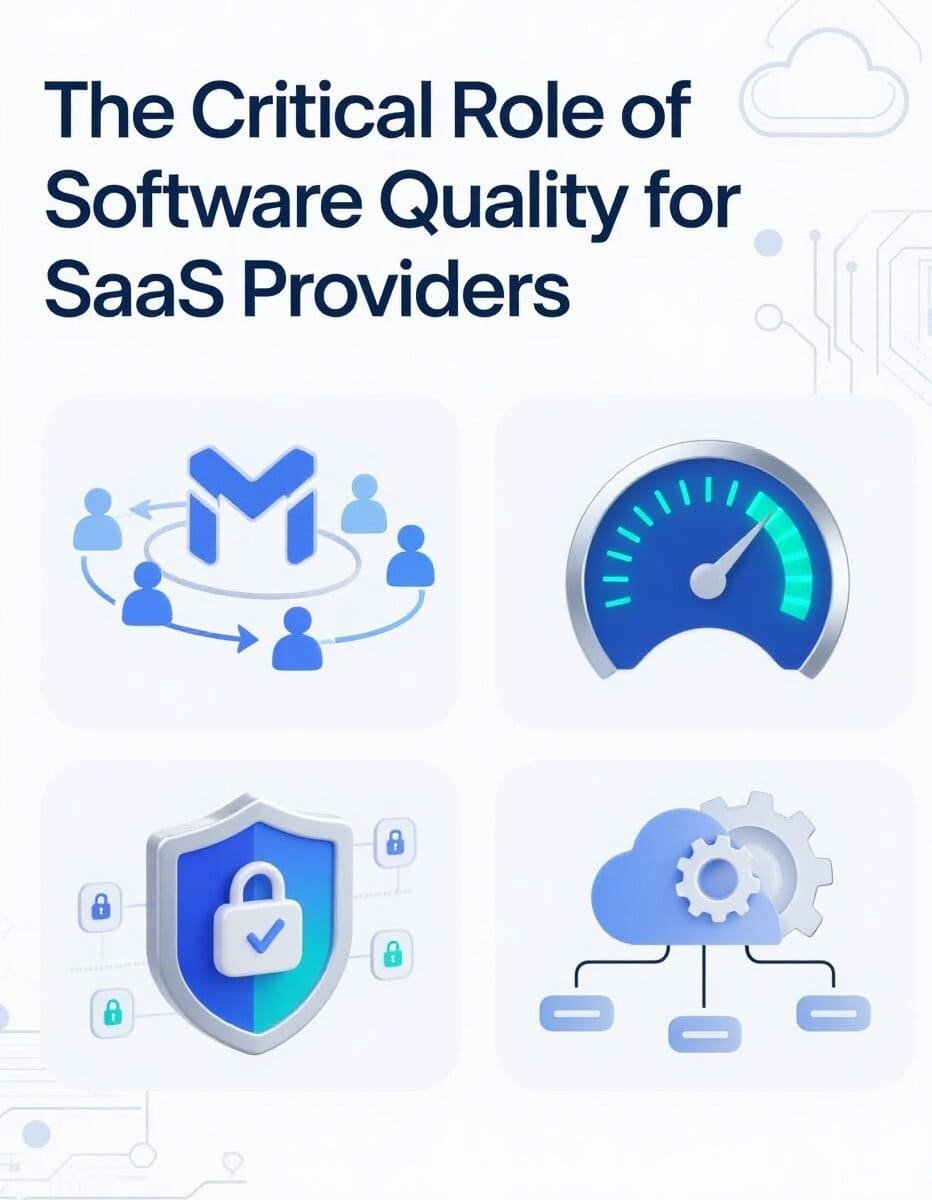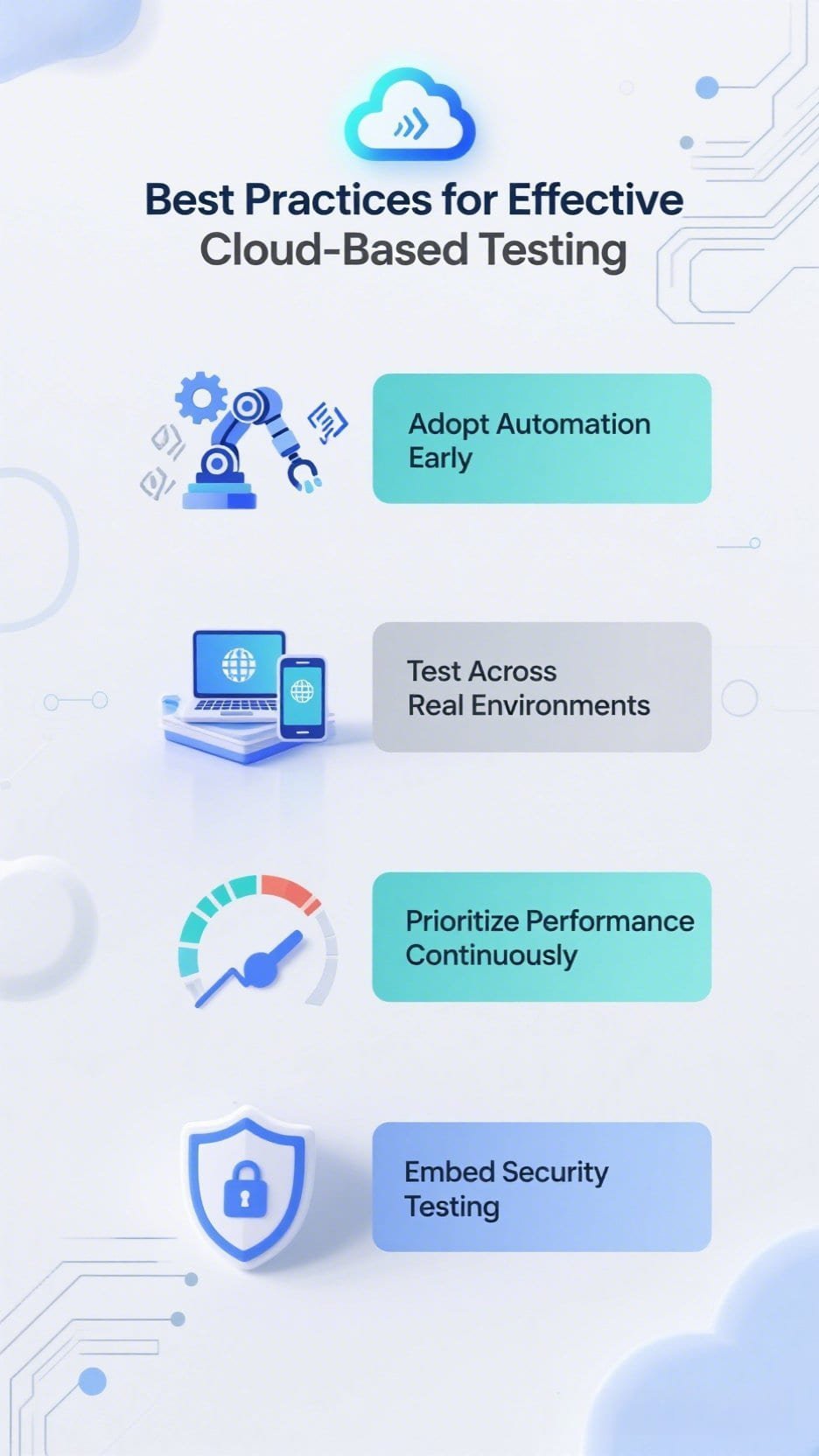Cloud-Based Testing: Enhancing Software Quality for SaaS Companies in 2025
SaaS-based firms are always under pressure to maintain safe, expandable, and effective applications.
The rapid growth of the cloud computing and artificial intelligence industries has positioned cloud application platforms as a reliable solution.
These platforms have become the most widely adopted tools for businesses seeking flexibility, live reporting, and greater operational efficiency.
Such a paradigm shift has transformed cloud testing services into a key strategy of successful SaaS companies, which allows them to perform testing of their performance, loads, and security over global infrastructure.
By utilizing test automation tools and cloud computing applications, software developers can shorten release cycles while maintaining high-quality standards.
This helps them stay competitive and meet growing customer demands.
Understanding Cloud-Based Testing in SaaS
Conventionally, the establishment and configuration of test environments, infrastructure management, and test coverage scaling have been major bottlenecks for SaaS providers, and they are not only slow but also expensive.
Cloud testing services effectively change this paradigm by making the whole process lean and slender with the help of strong cloud services and on-demand resources.
Through cloud-based testing, SaaS products can now test the application in minute detail, conduct extensive performance tests, and safeguard software quality on a scale of sales technology, devices, and network interfaces with or without a hardware infrastructure in place.
The virtualized environments are on-demand provisioned and fit perfectly within the iterative and rapid characteristics of Agile and DevOps approaches.
The Critical Role of Software Quality for SaaS Providers

For Software-as-a-Service (SaaS) providers, exceptional software quality is not merely a feature—it is the bedrock of their business model.
Given that SaaS operates on recurring revenue, high quality is directly linked to customer retention, brand reputation, and competitive advantage.
In a crowded market, users have little tolerance for bugs, downtime, or security flaws. Here are the key reasons why software quality is critical:
Drives Customer Retention:
A seamless, reliable user experience is paramount for keeping subscribers. Comprehensive QA software testing services ensure applications are robust and bug-free, preventing customer churn.
Guarantees Application Performance:
Users expect fast, responsive applications. Leveraging dedicated performance testing services is essential to identify and eliminate bottlenecks, ensuring the software performs optimally even as user load scales.
Builds User Trust and Protects Data:
A single data breach can irreversibly damage a brand’s reputation. Rigorous security testing services are vital for protecting sensitive user data and demonstrating a commitment to security, which is a key factor in building long-term trust.
Enables Scalable and Efficient Testing:
To maintain quality across diverse user environments, a modern approach is needed. A cloud testing service provides the on-demand infrastructure required to conduct thorough, scalable testing efficiently.
Key Types of Cloud-Based Testing for SaaS
An efficient cloud testing approach involves multiple types of testing with various crucial points to be proved with regard to the application.
Performance of professional cloud testing services will guarantee full coverage in the following key areas.
Functional Testing
It confirms that every functionality and feature of the SaaS application will work within the necessary demands.
It is through cloud platforms that validation can be easily achieved on a wide range of environments.
Performance Testing
This plays an important role in knowing how an application will react to certain loading and stress circumstances.
With the help of specialized performance testing services, teams can measure the effect of bursts of traffic and user load to locate cases of performance bottlenecks and the effect on the application’s responsiveness to ensure that the product’s performance remains stable.
Security Testing
With cyber threats constantly evolving, security is paramount. The security testing services are required to discover any possible vulnerabilities, safeguard delicate data, and make sure that the application meets the industry rules and regulations, such as GDPR, HIPAA, and SOC 2.
Compatibility Testing
This means that the application provides the same and smooth experience to the user across a huge range of browsers, operating systems, and devices.
A very large mixture of arrangements is available by the cloud environment so that it could be tested out properly.
Scalability Testing
This determines how well an application can scale its performance and resources to the rise or fall in the user fluctuations, which is essential in any successful SaaS product.
Integration Testing
This vindicates the smooth integration and data transfer between the main SaaS application and third party external APIs or internal integrated systems.
Leveraging Automation in Cloud-Based Testing
The employment of automation in cloud-based testing is a revolutionary measure in modern software development that allows teams to attain unprecedented levels of speed, coverage, and precision.
This approach, which is fundamental to cloud native testing for cloud applications, harnesses the strength of computerized scripts with the flexibility of the cloud, enabling firms to significantly improve their quality assurance processes.
Such cooperation is the key to staying aligned with agile and DevOps cycles.
Key aspects of leveraging automation in the cloud include:
Accelerated CI/CD Pipelines: Automation is the engine of continuous integration and deployment.
By integrating automated test scripts, cloud testing services can instantly provision environments and run tests on every code commit, providing rapid feedback to developers.
Massive Parallel Execution:
Using cloud infrastructure, hundreds of automated tests can be run simultaneously on various browsers, devices, and operating systems.
This significantly speeds up the time to execute extensive regression suites, not hours but minutes.
Enhanced Performance and Security Testing:
Specialized assessments depend greatly on automation. It enables performance testing services to mimic the high user loads, and security testing services perform repeated/automated vulnerabilities checks in the pipeline.
Improved Efficiency and Accuracy:
Software testing services provided by expert QA service providers are automated to reduce repetitive manual tasks and minimize the risk of human error.
This ensures consistent and reliable test results, enabling teams to deploy higher-quality software more quickly.
Best Practices for Effective Cloud-Based Testing

SaaS companies should adhere to a set of proven best practices that enhance reliability, speed, and quality to maximize the return on investment from cloud-based testing.
Adopt Automation Early:
Integrate test automation from the project’s inception. Using a reliable test automation platform helps streamline repetitive tasks and significantly reduces manual effort.
Test Across Real Environments:
Utilize cloud-based labs to validate application performance and compatibility across a wide range of real devices, browsers, and operating systems.
Prioritize Performance Continuously:
Do not treat performance testing as an afterthought. Continuously run performance tests throughout the development cycle to monitor application speed and scalability.
Embed Security Testing:
Make security an integral part of the entire testing process. Use secure testing environments that mirror production to identify and mitigate vulnerabilities as early as possible.
The Future Impact of Cloud-Based Testing
Cloud testing services are being moved in the direction of increased intelligence and agility scale.
SaaS businesses are increasingly focusing on AI-based test healing and predictive analytics to simplify redundant routine tasks.
These technologies also help manage dynamic and data-driven test cases using self-corrective scripts.
Testing is being democratized; with the emergence of codeless automation platforms, there is less pressure to use specialized skills, and teams can focus on making the user experience of the product better.
Ultimately, cloud-based testing is no longer just an option, but a foundational element for success in the SaaS industry.
A comprehensive testing approach must be used, including automation, quality assurance, cost prioritization that favors security, and a diversity of testing methods.
Through these practices, SaaS firms providing QA software testing services can achieve significant cost savings and accelerate their time to market.
This also helps them deliver high-quality, dependable, and secure applications that meet consumer expectations.
About the Author!
Kanika Vatsyayan, VP – Delivery & Operations at BugRaptors, is a QA expert with 10+ years of experience. She specializes in agile practices, automation, and test strategy, and shares insights on manual, automation, and cloud testing services through her blogs.
